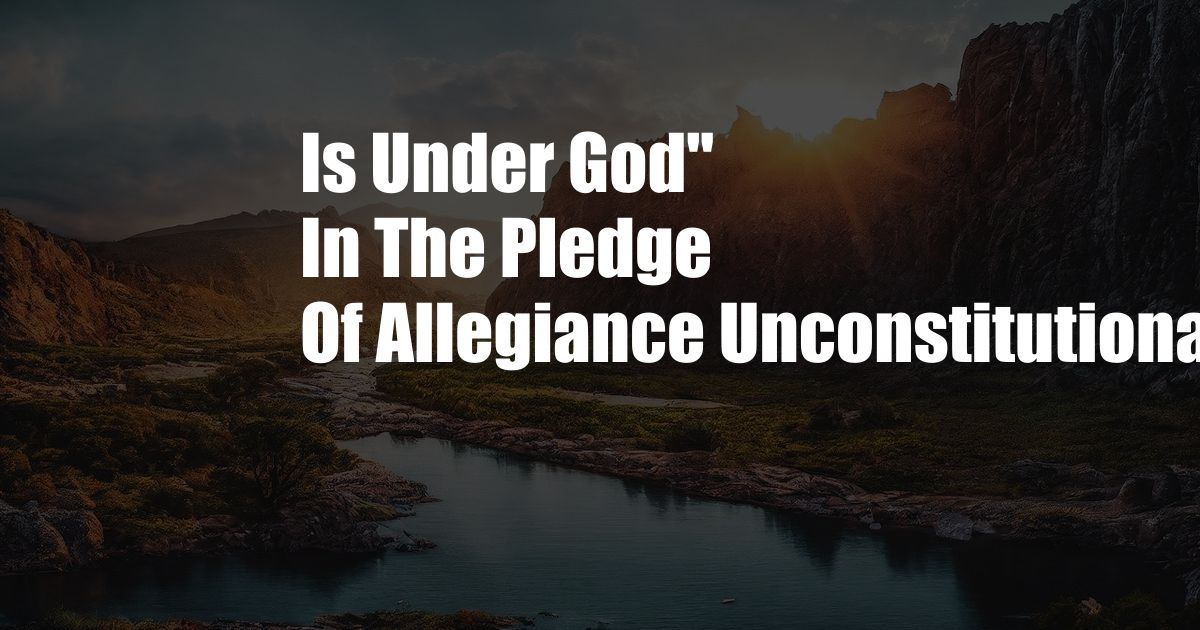
Is “Under God” in the Pledge of Allegiance Unconstitutional?
In the wake of a recent court ruling, the phrase “under God” in the Pledge of Allegiance has once again become a subject of debate. Some argue that it violates the separation of church and state, while others maintain that it is a harmless acknowledgment of our nation’s religious heritage.
In this article, we will delve into the history, meaning, and legal implications of the phrase “under God” in the Pledge of Allegiance. We will also examine the latest trends and developments related to this topic, providing readers with a comprehensive overview of one of the most enduring symbols of American patriotism.
A Brief History of the Pledge of Allegiance
The Pledge of Allegiance was first written in 1892 by Francis Bellamy, a Christian socialist and minister. The pledge was originally intended to promote patriotism and unity among Americans, and it quickly gained widespread popularity. In 1954, Congress added the phrase “under God” to the pledge in response to the growing threat of communism.
The addition of “under God” was controversial at the time, and it has remained so ever since. Opponents of the phrase argue that it violates the separation of church and state, which is a fundamental principle of the U.S. Constitution. Supporters of the phrase, on the other hand, argue that it is a harmless acknowledgment of our nation’s religious heritage.
The Legal Implications of “Under God”
The legal implications of the phrase “under God” in the Pledge of Allegiance are complex. In 1962, the Supreme Court ruled in Engel v. Vitale that school-sponsored prayer was unconstitutional because it violated the separation of church and state. However, the Court has not yet ruled on the constitutionality of the phrase “under God” in the Pledge of Allegiance.
There have been several lower court rulings on the issue, with some courts upholding the constitutionality of the phrase and others striking it down. The most recent ruling came in 2019, when a federal appeals court ruled that the phrase “under God” was unconstitutional. However, this ruling is currently being appealed to the Supreme Court.
The Latest Trends and Developments
In recent years, there has been a growing movement to remove the phrase “under God” from the Pledge of Allegiance. This movement is being led by atheist and secularist groups, who argue that the phrase is offensive and exclusionary. In response, several states have passed laws requiring public schools to recite the Pledge of Allegiance with the phrase “under God” intact.
The debate over the phrase “under God” in the Pledge of Allegiance is likely to continue for many years to come. It is a complex issue with no easy answers. Ultimately, it is up to the Supreme Court to decide whether or not the phrase is constitutional.
Tips and Expert Advice
If you are interested in learning more about the debate over the phrase “under God” in the Pledge of Allegiance, here are a few tips:
- Read the Supreme Court’s ruling in Engel v. Vitale.
- Read the lower court rulings on the constitutionality of the phrase “under God” in the Pledge of Allegiance.
- Follow the news for updates on the latest developments in the debate.
- Talk to people who have different views on the issue.
By following these tips, you can gain a better understanding of the complex issue of the phrase “under God” in the Pledge of Allegiance.
FAQ
Q: Is the phrase “under God” in the Pledge of Allegiance constitutional?
A: The Supreme Court has not yet ruled on the constitutionality of the phrase “under God” in the Pledge of Allegiance. However, there have been several lower court rulings on the issue, with some courts upholding the constitutionality of the phrase and others striking it down.
Q: Why do some people oppose the phrase “under God” in the Pledge of Allegiance?
A: Some people oppose the phrase “under God” in the Pledge of Allegiance because they believe that it violates the separation of church and state. They argue that the government should not be endorsing any particular religion.
Q: Why do some people support the phrase “under God” in the Pledge of Allegiance?
A: Some people support the phrase “under God” in the Pledge of Allegiance because they believe that it is a harmless acknowledgment of our nation’s religious heritage. They argue that the phrase does not violate the separation of church and state because it does not require anyone to believe in God.
Q: What is the future of the debate over the phrase “under God” in the Pledge of Allegiance?
A: The debate over the phrase “under God” in the Pledge of Allegiance is likely to continue for many years to come. It is a complex issue with no easy answers. Ultimately, it is up to the Supreme Court to decide whether or not the phrase is constitutional.
Conclusion
The phrase “under God” in the Pledge of Allegiance is a complex and controversial issue. There are strong arguments on both sides of the debate. Ultimately, it is up to each individual to decide whether or not they believe that the phrase is constitutional.
I encourage you to learn more about this issue and to form your own opinion. The future of the debate over the phrase “under God” in the Pledge of Allegiance is in your hands.
Are you interested in learning more about the Pledge of Allegiance?